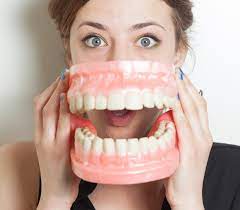When exploring tooth replacement options, it’s important to understand the different types of dentures: full, partial, and more. Each type serves a unique purpose depending on how many teeth you’ve lost, your oral health, and your lifestyle needs. Teeth Dentures In Dubai are custom-made appliances designed to restore both function and appearance, allowing you to chew, speak, and smile with confidence. Choosing the right type of denture can dramatically improve your quality of life.
Full Dentures – For Complete Tooth Replacement:
Full dentures, also called complete dentures, are designed for individuals who have lost all their teeth in the upper or lower arch—or both. These are the most traditional type of dentures and are often made from acrylic resin that mimics the natural look of gums and teeth. Key features of full dentures include:
- Upper dentures cover the entire roof of the mouth for suction and stability
- Lower dentures are shaped to sit on the bottom arch without impeding tongue movement
- Removable design allows for easy cleaning and overnight soaking
- Custom-molded base provides a snug fit against the gums
Full dentures restore facial volume and chewing function and are often used by older adults or those who’ve experienced extensive tooth loss due to gum disease or injury.
Partial Dentures – Filling in the Gaps:
Partial dentures are ideal for individuals who still have some natural teeth remaining. These dentures consist of a metal or acrylic base that holds one or more artificial teeth in place, fitting around the existing teeth for support. Common types of partial dentures include:
- Cast metal partials, known for durability and strength
- Acrylic partials, typically used as temporary or transitional solutions
- Flexible partials, made from softer materials for improved comfort and aesthetics
Benefits of partial dentures include:
- Preserving natural teeth while restoring chewing function
- Preventing shifting or misalignment of remaining teeth
- Improving speech clarity and facial balance
They are removable and typically secured with clasps or precision attachments to blend naturally with your smile.
Immediate Dentures – A Temporary Solution:
Immediate dentures are placed right after tooth extraction, offering a temporary solution while your gums and jaw heal. These dentures are pre-made and adjusted to fit once the teeth are removed. Their advantages include:
- Avoiding a toothless period after extractions
- Helping control bleeding and swelling during the healing phase
- Allowing early adaptation to wearing dentures
However, because your jawbone and gums shrink after extractions, immediate dentures often need relining or replacement later on. They serve as a stepping stone before receiving permanent full or partial dentures.
Overdentures – Added Stability and Comfort:
Overdentures are removable dentures that fit over a small number of remaining natural teeth or dental implants. These are ideal for patients who want extra support and retention. Overdentures can be used in both upper and lower jaws and offer:
- Enhanced stability over traditional full dentures
- Improved chewing efficiency
- Less gum irritation, since they’re more securely anchored
- Support for jawbone preservation, especially when placed over implants
They’re particularly popular among patients transitioning from natural teeth to dentures or those seeking a more comfortable, long-term option.
Implant-Supported Dentures – A Modern Alternative:
For those seeking a secure, non-removable solution, implant-supported dentures provide a modern and effective alternative. These Teeth Dentures are anchored to dental implants surgically placed in the jawbone. Benefits of implant-supported dentures include:
- Exceptional stability with no slipping or clicking
- Stronger bite force, allowing more food options
- Preservation of jawbone density through osseointegration
- Long-term durability with proper care
They can be fixed (permanent) or removable depending on the design and number of implants used. While they involve a higher upfront cost and surgical procedure, many patients find them the most comfortable and natural-feeling option available.
Choosing the Right Type of Denture for You:
Selecting the right denture depends on several personal and medical factors. When discussing the types of dentures: full, partial, and more with your dentist, be sure to consider:
- Number of missing teeth
- Condition of your gums and remaining teeth
- Bone density and eligibility for implants
- Budget and long-term goals
- Comfort and appearance preferences
Whether you're transitioning from natural teeth, replacing old dentures, or considering implants, there's a denture solution that fits your lifestyle and restores your confidence. A dental consultation will help guide you toward the best fit for your needs and ensure a smooth and successful experience.





Comments